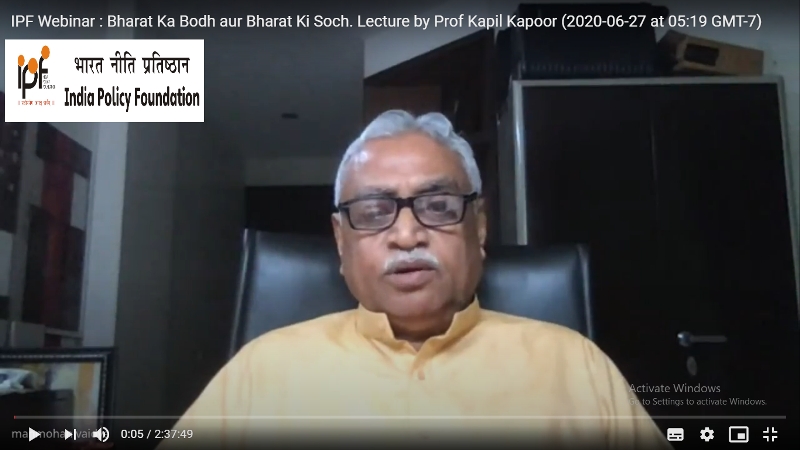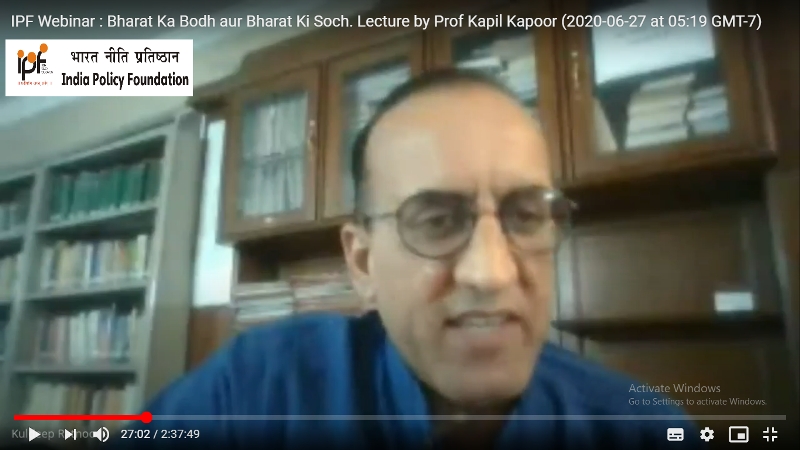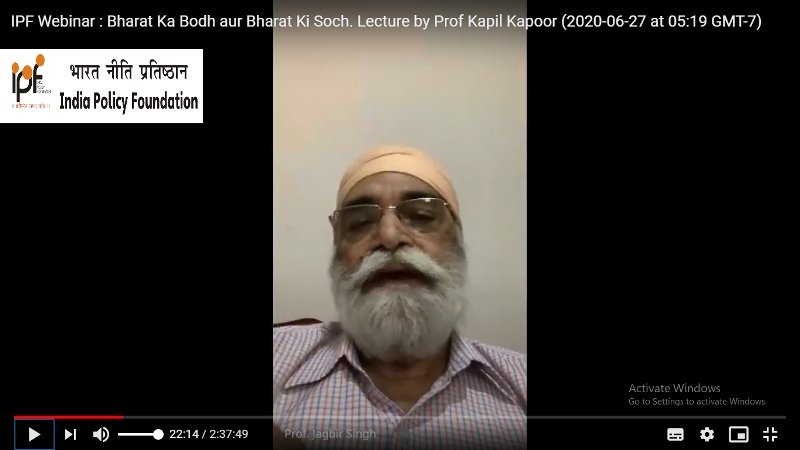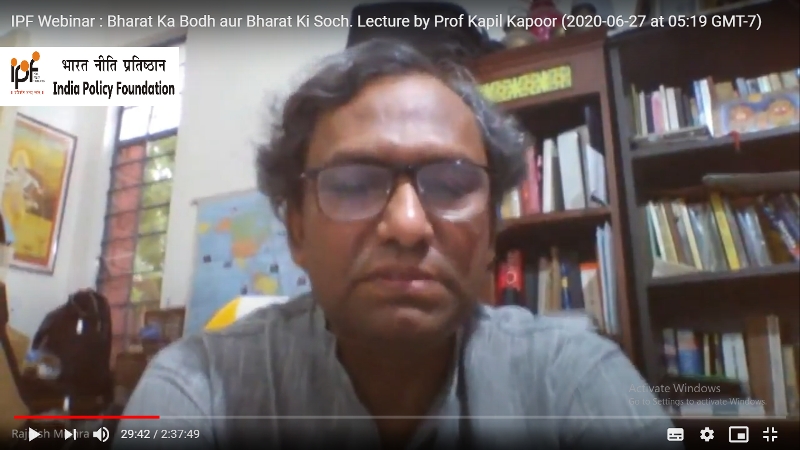IPF Webinar on ‘Bharat ka Bodh aur Bharat ki Soch’
28 Jun 2020 22:15:00
IPF Webinar
on
‘Bharat ka Bodh aur Bharat ki Soch’
June 27, 2020
Dr Kuldeep Ratnoo
Today’s webinar was to be addressed by Prof. Kapil Kapoor. He is present in the webinar but due to some technical glitch, his voice is not coming to us. It is very unfortunate for all of us who wanted to hear him speak on this insightful topic.
However, we are lucky to have amongst us renowned intellectuals and thinkers to start the discussion. To begin with, I humbly request Dr Manmohan Vaidya ji, who is Sah-Sarkaryavah of RSS, and who writes and speaks with authority on issues concerning our national identity, and idea of India. Today’s topic is close to his heart and though he joined us as a listener, with sincere apology we request him to kindly address us and enlighten us all.
Shri Manmohan Vaidya
I wanted to hear Prof Kapoor speak on today’s topic ‘Bharat ka Bodh aur Bharat ki Soch’. But unfortunately, technical issue has deprived us from his profound wisdom.

Since I have been asked to give you a brief introduction of the topic, I will share some points which are important and relevant for the contemporary discourse.
Bharatiya concept of “Rashtra” is based on our view of life, where people, not the state, define the “Rashtra”, the nation. All people of this country, despite diversities of various types, subscribe to a spirituality-based, holistic and integral view of life. Deep entrenchment of this view of life in our psyche develops a feeling of belongingness with all members of society and with the whole landmass that we inhabit and call Bharat.
When we talk about identity of Bharat, it is important to understand that we have never argued for nationalism or super nationalism. Our continued efforts that were instrumental in ushering in this country-wide awakening have been consistently opposed and labelled as “nationalism” by the self- proclaimed communist-minded academicians and journalists. In the true sense of the word, the movement leading to this mass awakening is “national”, not “nationalism”. The word “nationalism” featured neither in Bharatiya vocabulary nor in Bharatiya consciousness. It is the byproduct of the concept of “nation-state” of the Western democracies. Those countries are nationalistic. They forced two World Wars upon the world. Their nationalism is rooted in their capitalistic ideological past. And the now oft-discussed “super-nationalism” is a manifestation of Communism.
What we have always said is we shouldn’t deny our identity in the guise of being liberal and progressive. We must not forget that the history of our civilization dates back to over 10,000 years and the struggle now is in finding Bharat’s lost identity. Here, it is noteworthy to remember K M Munishi’s contribution in rebuilding the Somnath temple. Pandit Nehru was opposed to the idea and did not want the then President Rajendra Prasad to go for the inauguration. Nehru termed it an act of Hindu revivalism. But Dr Prasad, Munshi and many other senior leaders didn’t agree with Nehru on this. The Hindu way of life has been a part of Indian culture and it does not equate to nationalism or religion. Bharat has always celebrated its diversity.
Indian traders have gone all over the world to do trade with other nations, but Bharat has never colonized another country. We did not exploit or enslave anybody or tried to convert anyone. We created wealth in those countries. Bharat was always known by its identity which it earned through its merit and not by spreading a sense of fear. Nationalism was never a point of debate for us.
Bharat is known for its spirituality-based life. None of the other nations possess this strength. The western paradigm is now receding and the new paradigm will be holistic, integral and spiritual. Humanity will have to take the world forward with the all the differences in ethnicity, languages and religion. Bharat can lead the world in accepting diversities and ensuring a peaceful and prosperous life for all.
Bharat stands tall with its identity of ‘Vasudhaiva Kutumbakam’. Crores of people stand united with this thought. Their shared cultural past and the work done by reformers are important in people rediscovering their sense of identity. Setting aside our political and other vested interests and contributing in the re-emergence and re-establishment of true identity of Bharat is the task before all of us.
Dr Kuldeep Ratnoo
We are indeed grateful to Dr Vaidya ji for introducing the topic and enlightening us through an extempore. Thank you very much! Now, I request Prof Jagbir Singh ji to kindly take this discussion further. Prof. Jagbir Singh ji is renowned thinker, writer and speaker. He retired as Professor of Punjabi language. He has written several books and he is highly respected for his in-depth and insightful knowledge of Vedic heritage and Sikhism.

Prof Jagbir Singh
India’s identity is deeply interlinked with its culture. While a number of civilizations have lost its cultural traditions, India has preserved them and it has become integral to the nation’s identity. During colonization, Indian culture was marginalized as the colonizers had understood that they can establish their authority only by suppressing the country’s culture and traditions. Unfortunately, even after independence, the lessons that we imbibed from the British were not forgotten and were diligently followed.

Later, some so-called eminent historians brought about a new narrative where Indian culture was relegated to the background and even criticized. Their ideology of secularism was deceptive as partition itself was based on religion. After Pakistan became an Islamic nation, it was evident that India was a Hindu Rashtra. But the leaders of that time chose not to acknowledge this fact. After political consultations, they decided to make India into a secular nation. This was acceptable as according to ‘Sanatana Dharma’, all faiths were accepted into the fold of India’s culture. But the problem arises when you realise that Indian culture was not given the respect that it deserved. Indian culture has always been pluralistic. For India, its culture has been a way of life. But not many are aware of the rich heritage of India.
It is the duty of all Indian citizens to make the younger generation aware of India’s culture and traditions. That is the only way to preserve India’s identity.
We need to understand that those who talk about modernism are looking at it through a prism of western epistemology. They have not understood the true meaning of India’s culture. Liberalism and pluralism are inbuilt in Indian culture. In Atharva Veda, it is clearly said that we need to look at everyone as friends. This is such a liberal perspective and is also a factor that is absent in other cultures. The perspective of Abrahamic civilization is not as liberal as ours. Their premise of faith is that only they are aware of the universal truth and all others are ignorant. But those who propagate western thoughts do not get this perspective. Indian culture believes that there is only one universal truth but there are multiple ways to reach that truth. This is a truly liberal perspective. We need to encourage the younger generation to think beyond the western perspective to understand this.
For the last 1000 years, an unknown culture was propagated in India. It was predominantly political ambition that was driving it ahead. It was a one-sided perspective. Indian culture has always been one of dialogue. We tried to have a dialogue with the other cultures but could not succeed as they were not interested. They were many ways for constructive negotiation in the four strands of Indian culture – Sanatana Dharm, Buddhism, Jainism and Sikhism. But the other culture did not want to negotiate as equals. There is no need to have a debate on mythology as each religion has its own, the need is to have equality from the perspective of humanitarian values.
Dr Kuldeep Ratnoo
Thanks a lot, Prof Singh for your valuable insights and guidance! Now I request Prof Rajnish Mishra to elaborate further on today’s topic and enlighten us more. Prof Mishra is currently associated with Department of Sanskrit and Indic Studies, Jawaharlal Nehru University.
Prof Rajnish Mishra
India’s identity is lost in the idea of India that is being presented now. India’s knowledge and culture have been its biggest assets. Take the case of Jammu and Kashmir, where the writings of Acharya Abhinav Gupta are not even remembered. India’s culture and knowledge have been forgotten in today’s times.

It needs to be understood that it does not imply that if you are different from us, we are opposed to you. There is unity in diversity and that is what the Indian culture is about. Indian culture has always been successful in finding a common thread and this is how India’s identity will be preserved. We should stop classifying our culture as history. Maharishi Valmiki and Maharishi Veda Vyas wrote about their present times and we need to learn from them how to preserve our culture and traditions.
Dr Kuldeep Ratnoo
Thank you very much, Prof Mishra! Now we have connected with Prof Kapoor and I will request him to kindly conclude today’s discussion. We all were keen to hear Prof Kapoor but we all are helpless when faced by technical problems. We hope this time we can hear Prof Kapoor clearly and benefit from his invaluable insights.
Prof Kapil Kapoor
Our Sanatan Sanskriti binds us into one unit. The majority of people of this nation do not have any doubt or confusion about Bharat Bodh or understanding of India, but the English medium educated intellectuals are not able to comprehend the true identity and meaning of Bharat. These ‘intellectuals’ have been cut off from the roots of this nation and its culture. Many of post independence politicians who framed constitution were also disconnected from the reality that Bharat was not a nation-state but a continuous culture and civilisation. Bharat is not limited to one language or race or belief. Our culture is not tied to one God or Prophet, unlike most other countries. But those who fail to understand Bharat raise questions about its true identity and idea.

Our politicians in 1947 realised that if they wanted to rule over people, they needed to divide them into caste, language and beliefs. These politicians claimed that divided India was like parts of Europe. It was not a single nation, but a sub-continent. Later, we realised that intention behind this was division of India into smaller parts. The first Prime Minister Jawaharlal Nehru divided States on the basis of language, whereas earlier such division was not there, and people from one part could freely move to and settle in other part. Society was not hostage to politics. But British used their education system to divide culturally one Bharat into fragments. Still, our identity is of being Hindu, and it is not a recently coined term as claimed by westernised intellectuals.
(Report prepared by Lekshmi Parameswaran. Inputs by Vikrant Tyagi)